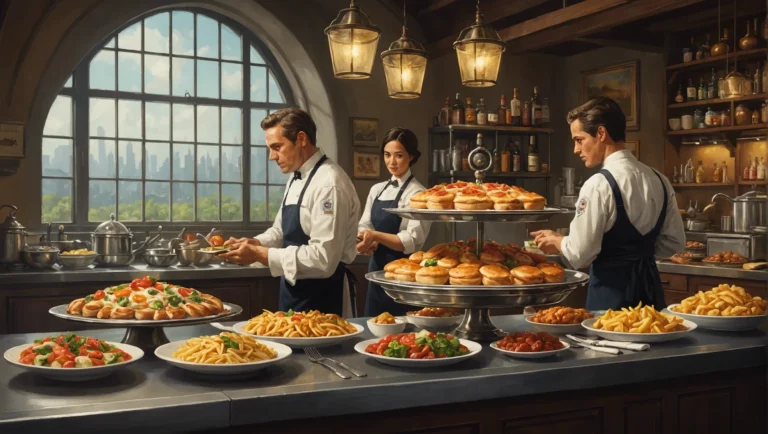Are you a restaurant owner struggling to find the right words to describe your food server position?
Crafting a compelling job description is crucial for attracting top talent to your establishment. In this ultimate guide, we’ll walk you through a food server’s essential duties, responsibilities, skills, and qualifications in 2024.
By the end of this article, you’ll clearly understand what it takes to be an exceptional food server and how to create a full server job description that stands out from the competition.
From greeting guests with a warm smile to expertly navigating the menu and delivering them with outstanding service, we’ll cover it all.
Let’s dive in and discover how to build a winning food server team that will elevate your restaurant’s dining experience to new heights.
Save 80% of delivery management time
We handle everything:
- Dedicated operations manager
- Real-time tracking dashboard
- Automated customer notifications
- Urgent issue resolution
Food Server Duties and Responsibilities: Ensuring Exceptional Dining Experiences
Greeting and Seating Guests
The first impression a guest has of a restaurant often comes from their interaction with the food server. As such, servers need to welcome guests warmly and professionally. This involves greeting them with a smile, introducing themselves, and guiding them to their tables. Servers should also provide menus and inform guests about any daily specials or promotions.
Taking Orders and Providing Recommendations
One of the most important responsibilities of a food server is taking orders accurately and efficiently. To do this, servers must have a thorough understanding of the menu, including ingredients, preparation methods, and potential allergens. They should be prepared to answer questions and provide personalized recommendations based on guests’ preferences and dietary restrictions.
Serving Food and Beverages
Once orders for meals have been placed, food servers are responsible for delivering food and beverages to tables promptly and accurately. This requires strong communication with the kitchen staff to ensure orders are prepared correctly and efficiently. Servers should also check that each dish is presented attractively and meets the restaurant’s quality standards.
Handling Payments and Maintaining Records
At the end of the meal, food servers are responsible for presenting bills and processing payments. This involves accurately calculating the total, including any applicable taxes or gratuities, and ensuring that the correct payment method is used. Servers must also maintain accurate records of customer orders and transactions, as this information is crucial for the restaurant’s financial management.
Maintaining a Clean and Safe Environment
In addition to their customer-facing responsibilities, food servers also play a role in maintaining a clean and safe dining environment. This may involve tasks such as:
-
Wiping down tables and chairs between guests
-
Restocking condiments, napkins, and other supplies
-
Assisting with general restaurant cleanliness and organization
-
Adhering to food safety and sanitation guidelines
By contributing to a clean and well-maintained restaurant, food servers help create a pleasant atmosphere for guests and support the overall success of the establishment. Learn how a mixologist contributes to the dining experience by understanding their key functions and obligations, critical in ensuring satisfaction and service quality.
Metrobi is transforming catering deliveries
Specialized solutions for catering businesses:
- Catering-trained drivers
- Proper handling equipment
- Peak day delivery support
- 23% average cost reduction
Food Server Skills and Qualifications: Hiring Top Talent for Your Restaurant
Communication and Interpersonal Skills
Effective communication is the foundation of exceptional customer service in the restaurant industry. Food servers must possess excellent verbal communication skills to accurately convey menu items, specials, and recommendations to guests. Active listening is equally important, as servers need to understand and address customer needs, preferences, and concerns.
Building rapport with guests is another crucial aspect of a food server’s job. A warm, friendly, and welcoming demeanor can create a positive dining experience and encourage repeat business. Servers should be able to read customers’ moods and adjust their approach accordingly, whether it’s offering a quick and efficient service for those in a hurry or engaging in friendly conversation with diners who appreciate a more personalized experience.
Attention to Detail and Memory
In a fast-paced restaurant environment, attention to detail is paramount. Food servers must accurately record orders, including any modifications or special requests, to ensure that each dish is prepared to the customer’s satisfaction. This requires a keen eye for detail and the ability to double-check orders before submitting them to the kitchen.
A strong memory is another valuable asset for food servers. Remembering regular customers’ names, preferences, and dietary restrictions can help create a personalized dining experience and foster loyalty. Additionally, servers must be able to recall daily specials, ingredient lists, and allergen information to provide accurate recommendations and answer customer questions.
Physical Stamina and Dexterity
Working as a food server is physically demanding, requiring long hours on one’s feet, walking, refilling water glasses, and carrying heavy trays. Candidates should possess the physical stamina to withstand the rigors of a busy shift, maintaining a positive attitude and level of service throughout.
Good hand-eye coordination and dexterity are also essential for food servers. Balancing and carrying trays laden with dishes, glassware, and utensils requires a steady hand and precise movements. Servers must be able to navigate through crowded dining areas, deliver orders to the correct tables, and serve food and beverages without spills or accidents.
Long shifts, demanding customers and high-pressure situations can take a toll on even the most experienced food servers. However, maintaining a positive attitude is crucial for creating a pleasant dining experience for guests. Servers should be able to manage stress, remain patient, and approach each interaction with enthusiasm and professionalism.
Training and Development
While some skills and qualities are innate, others can be developed through comprehensive training programs. Investing in your food servers’ training and development can help them excel in their roles and contribute to the overall success of your restaurant. Discover invaluable restaurant server training advice to ensure your staff delivers outstanding service and performance.
Training topics may include:
-
Menu knowledge and food preparation methods
-
Wine and beverage pairing recommendations
-
Point-of-sale (POS) system operation
-
Food safety and sanitation protocols
-
Conflict resolution and customer service techniques
Ongoing training and development opportunities, through events such as workshops, mentorship programs, and cross-training in other restaurant roles, can help retain top talent and foster a culture of continuous improvement.
By prioritizing these essential skills and qualifications when hiring food servers, restaurant owners can build a team of top talent dedicated to delivering exceptional dining experiences. A well-trained, skilled, and passionate service staff is the key to customer satisfaction, positive reviews, customer feedback, and a thriving restaurant business.
Food Server Job Requirements: Setting the Bar for Excellence
Education and Experience
While a high school diploma or equivalent is typically the minimum educational requirement for food servers, some restaurants may prefer candidates with additional education, such as a culinary degree or hospitality management courses. Previous experience in a restaurant or customer service role is highly valuable, as it demonstrates a candidate’s familiarity with the industry and their ability to interact with guests effectively.
Knowledge of basic food safety and sanitation practices is crucial for food servers to ensure the health and well-being of guests. This understanding should include proper food handling techniques, temperature control, and personal hygiene standards.
Certifications and Licenses
Depending on local regulations and the specific restaurant, food servers may be required to obtain certain certifications and licenses. A food handler’s certification is a common requirement, which ensures that servers understand and adhere to food safety guidelines. This certification typically involves completing a training course and passing an examination.
For restaurants that serve
alcoholic beverages, an alcohol service certification may be necessary. This certification demonstrates that the server understands responsible alcohol service practices, including age verification and recognizing signs of intoxication.
Some restaurants may also require their food servers to have first aid and CPR certification. This training equips servers with the knowledge and skills to respond effectively in case of a medical emergency.
Language and Technology Skills
Proficiency in the primary language spoken by guests is essential for food servers to communicate effectively and provide excellent customer service. In some cases, being bilingual or multilingual can be a significant asset, particularly in diverse communities or tourist destinations.
Basic math skills are necessary for food servers to calculate bills accurately and process payments efficiently. This includes the ability to add, subtract, and calculate percentages for tips and discounts.
Familiarity with point-of-sale (POS) systems and order-taking technology is increasingly important in modern restaurants. Food servers should be comfortable using digital devices to input customer orders, manage tables, and process payments. Experience with specific POS systems, such as Toast, Aloha, or Square, can be a valuable addition to a server’s skill set.
Physical Demands and Work Environment
Food serving is a physically demanding job that requires servers to be on their feet for extended periods, often walking, standing, and carrying heavy trays. The first server job description should clearly outline these physical demands to ensure that candidates are prepared for the rigors of the role. Discover how adopting a staggered shift approach can alleviate the physical strain on servers, benefiting both employee well-being and operational efficiency in the food service industry.
The work environment in a restaurant can be fast-paced, high-pressure, and sometimes stressful. Food servers must be able to maintain composure and professionalism in challenging situations, such as dealing with difficult customers or during peak service hours. The job description should provide an accurate picture of the work environment to help candidates assess their suitability for the position.
Food Server Training and Development: Investing in Your Team’s Growth
On-the-job training is the foundation of a food server’s development. It provides hands-on experience and allows servers to learn the intricacies of your restaurant’s operations. A comprehensive on-the-job training program should include:
-
Thorough training on menu items, ingredients, and allergens: Servers must have an in-depth understanding of the dishes they serve. This knowledge allows them to confidently answer customer questions, make recommendations, and accommodate dietary restrictions. Training should cover each menu item’s ingredients, preparation methods, and potential allergens. Discover top strategies for restaurant crew education to ensure your team is well-versed in menu intricacies and can deliver outstanding customer service.
-
Shadowing experienced servers: New hires can learn best practices and restaurant procedures by observing and working alongside seasoned staff members. This approach allows them to see how experienced servers interact with customers, handle orders, and navigate the restaurant layout.
Implementing a mentorship program can further enhance on-the-job training. Assigning experienced servers as mentors to new hires provides a dedicated resource for guidance and support. Mentors can:
-
Offer advice on handling challenging customer situations
-
Provide feedback on performance and areas for improvement
-
Share tips for maximizing efficiency and enhancing the guest experience
According to the National Restaurant Association, mentorship programs can lead to a 25% increase in employee retention rates.
Customer Service and Sales Training
Exceptional customer service is a key differentiator in the competitive restaurant industry. Investing in customer service and sales training empowers your food servers to create memorable dining experiences and drive revenue. Consider incorporating the following elements into your training program:
-
Workshops on effective communication and problem-solving techniques: Equip your servers with the skills to communicate clearly, actively listen, and resolve customer concerns. Role-playing exercises can help servers practice handling various customer interactions, from taking orders to addressing complaints.
-
Training on upselling techniques and suggestive selling: Encourage your servers to boost sales by recommending complementary items, such as appetizers, desserts, or premium beverages. Teach them to read customer cues and make personalized suggestions based on their preferences.
Food Safety and Hygiene Training
Ensuring food safety and hygiene is a critical responsibility of food servers. Regular training on proper food handling practices not only protects your customers’ health but also safeguards your restaurant’s reputation. Your training program should cover:
-
Food safety regulations and best practices: Teach servers about temperature control, cross-contamination prevention, and safe food storage. Regularly review and update your training to align with the latest food safety guidelines from organizations like the FDA and local health departments.
-
Proper handwashing techniques and glove usage: Emphasize the importance of frequent handwashing and demonstrate correct techniques. Train servers on when and how to use gloves to prevent bare-hand contact with ready-to-eat foods.
-
Identifying and reporting food safety hazards: Educate servers on recognizing signs of food spoilage, contamination, or unsafe practices. Encourage them to promptly report any management concerns to prevent potential foodborne illnesses.
Continuous Learning and Development
Investing in your food servers’ ongoing education demonstrates your commitment to their growth and success. Continuous learning opportunities can include:
-
Regular training sessions on new menu items, service techniques, or industry trends
-
Access to online learning platforms or industry-specific webinars
-
Encouraging servers to attend workshops or conferences to expand their knowledge and skills
By prioritizing continuous learning, you create a culture of excellence and empowerment among your food service and kitchen staff.
Measuring Training Effectiveness For Good Customer Feedback
To ensure your training programs are yielding the desired results, establish metrics to measure their effectiveness. Consider tracking:
-
Customer satisfaction scores and feedback related to server performance
-
Server retention rates and job satisfaction levels
-
Sales performance and upselling success rates
Regularly assess these metrics and gather feedback from your servers to identify areas for improvement in your training programs.
Understanding the Role of a Food Server
What Is A Food Server?
A food server, also known as a waiter or waitress, is a restaurant kitchen employee who plays a crucial role in the dining experience. They are responsible for taking orders, serving food and beverages, and ensuring that patrons and guests have a pleasant and satisfying meal. Food servers act as liaisons between the kitchen staff and the customers, communicating special requests, dietary restrictions, and any other concerns to ensure that each order is prepared and served correctly. Explore the importance of a food server, from their key functions to their significant impact, and see how they enhance the dining experience in a restaurant.
Food servers must possess a wide range of skills to excel in their role. They need to have excellent communication and interpersonal skills to effectively interact with customers, as well as a strong memory to accurately remember orders and any special requests. They must also be well-versed in the restaurant’s menu, and able to answer questions about ingredients, preparation methods, and potential allergens. Additionally, food servers must be able to work well under pressure, maintaining a positive attitude and efficient service even during busy periods. Discover the integral role of a manager in the kitchen, who is responsible for coordinating the seamless operation behind the scenes, including the duties and responsibilities that ensure every dish meets the restaurant’s high standards.
The Importance of Food Servers In The Restaurant Industry
Food servers play a vital role in the success of a restaurant. They are often the first and last point of contact for customers, making their interactions crucial for creating a positive dining experience. A skilled and attentive food server can enhance a customer’s overall impression of the restaurant, leading to increased customer loyalty, positive reviews, and ultimately, higher sales. Explore the responsibilities of a food server, from greeting guests to managing orders, and how they contribute significantly to a restaurant’s atmosphere and customer satisfaction.
Building Customer Relationships and Loyalty
Food servers have the opportunity to build rapport with customers, creating a personal connection that can lead to repeat business. By providing excellent service, remembering regular customers’ preferences, and going above and beyond to accommodate special requests, food servers can foster a loyal customer base that will continue to support the restaurant. Struggling with staffing your food service establishment? Explore impactful methods for recruiting and maintaining top-notch restaurant employees to enhance customer loyalty.
Upselling and Increasing Restaurant Revenue
Skilled food servers can also contribute to a restaurant’s financial success by effectively upselling menu items. By making informed recommendations, suggesting complementary dishes or beverages, and highlighting high-profit items, food servers can increase the average check size and boost the restaurant’s overall revenue. Understand how a manager in a restaurant plays a crucial role in training and motivating servers to maximize sales and enhance your establishment’s profitability.
The Impact of Excellent Food Server Performance on Restaurant Reputation
In the age of social media and online reviews, a restaurant’s reputation is more important than ever. Food servers play a significant role in shaping a customer’s opinion of the restaurant, and their performance can directly impact the restaurant’s online presence.
Positive reviews that mention exceptional service provided by food servers can attract new customers and improve the restaurant’s overall rating on platforms like Yelp, Google, and TripAdvisor. On the other hand, negative reviews citing poor service can deter potential customers and damage the restaurant’s reputation.
Food Servers vs. Waiters: Is There a Difference?
Similarities Between Food Servers and Waiters
In the restaurant industry, the terms “food server” and “waiter” are often used interchangeably. Both roles involve taking orders from guests, serving food and beverages, and ensuring a pleasant dining experience. Food servers and waiters are the primary point of contact between the restaurant and its customers, making their roles crucial for customer satisfaction and loyalty. Explore the pivotal position of a food runner within the restaurant sector, understanding their responsibilities and their significance in promoting seamless service between the kitchen and the customer.
According to the Bureau of Labor Statistics, there were approximately 2.1 million waiters and waitresses employed in the United States as of May 2023. This number includes both food servers and waiters, as the Bureau of Labor Statistics does not distinguish between the two roles in their data collection. Discover the importance of the restaurant busser role, which encompasses both assisting waitstaff and maintaining a clean dining environment, as a pivotal component of the service team.
Differences Between Food Servers and Waiters
While food servers and waiters share many similarities, there can be slight differences in their roles depending on the establishment. In some restaurants, particularly those with a more formal or upscale atmosphere, waiters may have additional responsibilities beyond taking orders and serving food.
In fine dining restaurants and hotels, waiters may be responsible for a table setting with linens, silverware, and glassware before guests arrive. They may also be trained to prepare simple dishes, such as salads or desserts, tableside. This level of service is less common for food servers in casual dining establishments.
Crafting the Perfect Food Server Job Description
Food servers are the face of your restaurant, ensuring guests have an exceptional dining experience. By clearly defining the duties, responsibilities, closing duties, skills, and qualifications required for the role, you can attract top talent and build a strong team. Discover the integral role of food servers in enhancing customer satisfaction and their primary functions within the restaurant environment, similar to how an assistant chef supports culinary excellence.
When hiring food servers, look for candidates with excellent communication and interpersonal skills, attention to detail, and physical stamina. Provide comprehensive training programs to help your servers excel in their roles and deliver outstanding customer service.
Are you ready to create a food server job description that sets your restaurant and dining area apart? Use this template as a starting point, and tailor it to your unique needs and requirements. With the right team in place, you can elevate your guests’ dining experiences and establish your restaurant as a top choice in the dining area in your community.














